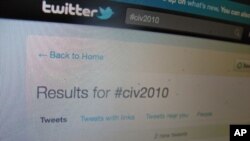While Ivory Coast President Laurent Gbagbo resists pressure to leave power after a recent election in which the United Nations says he was defeated, the controversy has given rise to a lively debate on the social micro-blogging website Twitter.
So-called threads, or ongoing discussions, on the Twitter website are identified by a hash mark and a certain code, so participants can easily find each other through a basic search. One of those who initiated the "CIV2010" Twitter code before this year's presidential election in divided Ivory Coast was Mohamed Diaby.
Diaby, an Abidjan-based web entrepreneur, said he is surprised at how the discussion has gained participants in the past few weeks, and that some newcomers had never used Twitter before.
The Twitter discussion has gained interest as two Ivorian political leaders, sitting President Gbagbo and his challenger, Alassane Ouattara both claim to have won the November 28th run-off election. The first was certified the winner by the country's constitutional council that threw out votes from the rebel-held north, and the second was certified by the United Nations as part of a peace deal.
A participant who wants to be identified only by his first name, Kanigui, says Twitter has become a very useful tool to stay informed within Ivory Coast. He said foreign media have been cut off in southern Ivory Coast, meaning most residents have had to rely on state media extremely favorable to Mr. Gbagbo's position for their information. The Twitter discussion, he explained, with all its links to other information, as well as its diversity of opinions, gives a broad horizon of sources.
Kanigui said that unlike other social media websites where comments have quickly become violent and divisive, the Twitter discussion has remained in his words, responsible, calm, courteous and professional.
He said initiators like Diaby, who also play the role of virtual moderators, check on rumors that are posted, quickly call these out if they are found to be false, and only retweet - that is disseminate again - information that is found to be accurate.
Participants include not only Ivorians, both in and out of the country, but West Africans in general, as well as French nationals, Americans and concerned citizens around the world. Journalists, such as Kwesi Pratt from Ghana's Insight Newspaper, also have found the discussion useful.
"The twitter feed brings out the real feelings of people," said Pratt. "It is not like the traditional media, which has to go through some norms and so on. Twitter is the real feeling of the people. It is much, much better."
One of those digging the Internet to find new information to post in the discussion is Senam Beheton, a Benin national, who works in the United States and West Africa on technology-based learning and teaching. He went to high school in Ivory Coast.
"I think there will be a before and after "#CIV2010" - meaning Cote d'Ivoire 2010 - and the reason is that it includes not just Ivorians, you have all kinds of nationalities," said Beheton. "In Benin, for example, we have elections coming up in March and it is going to be interesting to see how Twitter is used, but I can guarantee you that it is going to be central as well."
In the meantime, in Ivory Coast, Diaby, one of the initiators of the current Ivory Coast Twitter discussion, said he does not content himself with just sitting behind a computer, but also makes the rounds of Abidjan to see what is happening, so he can better play his self-appointed role of online information moderator.
He said he has received threats against his safety, but his role as online information moderator is worth the risks involved.
The latest tweets centered around the arrival of soldiers loyal to President Gbagbo who were trying to surround the hotel where his rival, Mr. Ouattara, has established his headquarters, protected by former rebels and U.N. peacekeepers.
Ivory Coast Debate Lights Up on Twitter












